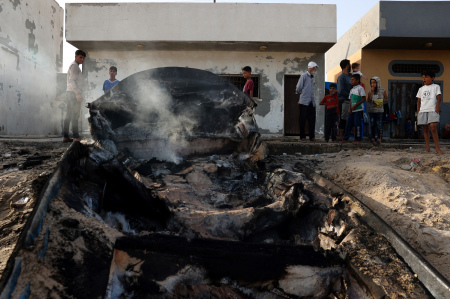UN top court orders Israel to 'immediately' halt military offensive in Rafah

The United Nations' top court has ordered Israel to cease an offensive in the Gaza Strip's southern city of Rafah, where the Israeli military believes Hamas leaders and operatives may be hiding.
On Friday, the International Court of Justice, located in the Hague, voted 13 to 2 that Israel "immediately halt its military offensive and any other action in the Rafah governorate."
The court ruled on a case South Africa brought against Israel, accusing the Jewish state of committing genocide. ICJ Vice-President Julia Sebutinde of Uganda and Ad Hoc Judge Aharon Barak of Israel were the two dissenting votes.
According to the court, Israel must cease operations in Rafah, "which may inflict on the Palestinian group in Gaza conditions of life that could bring about its physical destruction in whole or in part."
Israel must keep "open the Rafah crossing for unhindered provision at scale of urgently needed basic services and humanitarian assistance," the ruling states.
Israel launched an operation in Gaza last October after a surprise attack from Hamas on Oct. 7 resulted in the deaths of at least 1,200 people, primarily civilians, and the abduction of more than 240 individuals. Israel seeks to eliminate Hamas, the terror group that has controlled the Gaza Strip since 2007, and secure the release of the hostages.
The Hamas-run Gaza Health Ministry claims that over 35,000 people have been killed since the offensive began. However, these numbers do not distinguish between civilians and terrorists.
"The charges of genocide brought by South Africa against Israel at the International Court of Justice in the Hague are false, outrageous and morally repugnant," the head of Israel's National Security Council and the spokesperson for its Ministry of Foreign Affairs said in a Friday joint statement.
"Israel has not and will not conduct military actions in the Rafah area which may inflict on the Palestinian civilian population in Gaza conditions of life that could bring about its physical destruction in whole or in part," the statement continued. "Israel will continue its efforts to enable humanitarian assistance and will act, in full compliance with the law, to reduce as much as possible harm caused to the civilian population in Gaza."
Israel promised it would continue to enable humanitarian assistance to enter through the Egyptian side of the Gaza border and "prevent terror groups from controlling the passage."
One of the issues with administering humanitarian aid to the Gaza Strip, according to Israeli officials, is that Hamas typically steals it and sells the aid for more than what it's worth on the black market.
Some argue that the ICJ's order was not a total injunction for Israel to stop its operation in Rafah but to limit it so as not to come into violation of the Genocide Convention.
Arsen Ostrovsky, a human rights attorney and CEO of the International Legal Forum, told the Jewish News Syndicate Friday the order's use of the phrase "which may" means the "court did not say Israel must halt entirely and unconditionally."
"Israel, therefore, would be within its rights to contend the proposed operation in Rafah does not inflict that which the court said should not, and therefore continue, perhaps with some modifications and further humanitarian allowance," he said.
The human rights attorney also condemned the ICJ's decision, calling it "another egregious perversion of justice on the path to an irrevocable breakdown of the international legal order that was nothing more than a gift to the murderers and rapists of Hamas."
Samantha Kamman is a reporter for The Christian Post. She can be reached at: samantha.kamman@christianpost.com. Follow her on Twitter: @Samantha_Kamman





















